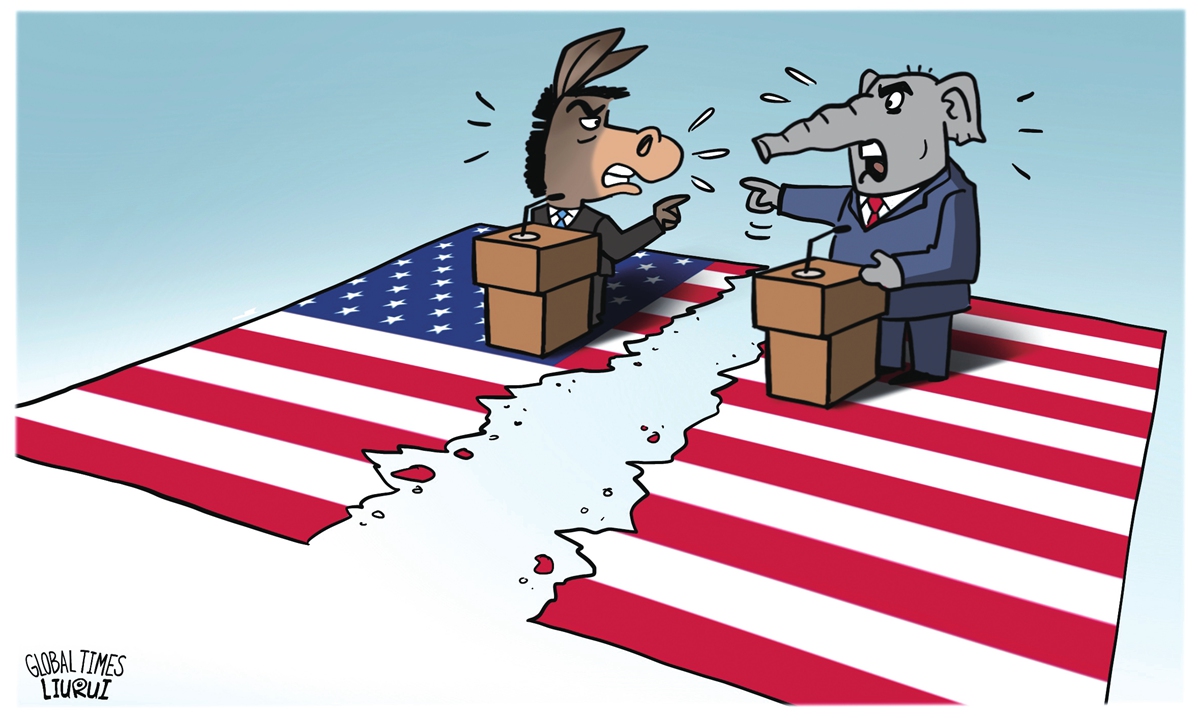
Illustration: Liu Rui/Global Times
Former President Donald Trump won the New Hampshire primary on Tuesday, solidifying his position on the Republican Party's presidential nomination and foreshadowing a potential rematch with President Joe Biden in the general election.
The possible rematch will be highly unusual and extraordinary for US politics, most likely tearing the US political life to pieces. Over the past several years, political life in the US has become highly divisive and polarized, with the political competition between Republicans and Democrats degenerating into personal attacks. There seems to be a lack of highly qualified candidates for both the Republican and Democratic parties. It suggests a potential flaw in the US political system, casting doubt on the vitality and sustainability of political life in the US.
Moreover, the leaders of both parties are unable to unite and cooperate effectively. Bipartisan collaboration appears to be a distant memory, with each politician eager to become a populist, disregarding both the realities within the US and the challenges on the international stage. Rather than seeking votes based on what truly matters, there is a trend toward polarized and extreme positions. The US is becoming, as The Economist claimed, the "disunited states of America."
This situation does not bode well for the US, as it appears that the political division within the country will likely intensify in the coming years. Consequently, there will be no expectation for its wise and far-sighted political solutions to the numerous challenges it currently faces, with a global landscape marked by escalating wars and conflicts. Despite its claim to global leadership, the US is not exercising a leadership role, but pouring more fuel onto the fire rather than using its resources and wisdom to solve any of the burning issues both at home and abroad. A victory for Trump is anticipated to bring considerable uncertainty for US allies. Within the Western camp, there is a growing sense of alarm regarding the potential for a second term for Trump. Canadian Prime Minister Justin Trudeau said on Tuesday that Trump's victory in the US presidential election represents a certain amount of unpredictability. Japan is particularly concerned that Trump's potential re-election could strain US-Japan relations, prompting Tokyo to take a "pre-emptive move" to mitigate potential challenges. In South Korea, many worry about the withdrawal of US troops from the country if Trump is re-elected.
Many other countries, especially Ukraine, have expressed concerns about Trump potentially being re-elected. Trump has claimed that if he were to be re-elected, he would end the war within 24 hours. While President Volodymyr Zelensky of Ukraine has asserted that Trump's rhetoric is very dangerous, he has also shown an interest in Trump's formula for ending the war. His proposed solutions, while potentially effective, could run counter to the fundamental interests of the Ukrainian government.
From the Chinese perspective, the US election is a purely domestic internal matter, and China's optimal approach is to patiently await the precise outcome of the presidential election. Most importantly, China needs to stand firm on matters of principle, and the two countries need to get along by respecting each other. Both sides should establish new guardrails, preventing unexpected events that could strain China-US relations, such as those related to technology, Taiwan and the South China Sea.
Regardless of who will be the president of the US, both sides are urged to actively engage, consult and assess matters bilaterally, ensuring the China-US relationship - the most critical bilateral relationship today - is normal, constructive and mutually beneficial. I strongly believe that China and the US will find a way to get along with each other. Both nations must embrace peace, as war is simply not an option. Whatever issues arise between China and the US, we should address and resolve them through peaceful means.
The author is a chair professor at Soochow University and Vice President of the Center for China and Globalization. opinion@globaltimes.com.cn




